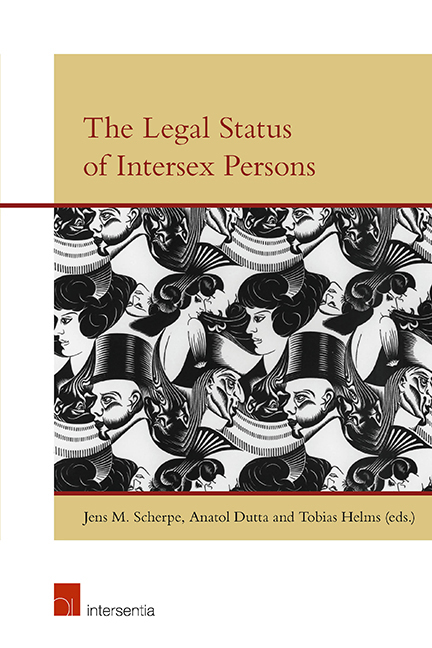Book contents
- Frontmatter
- Preface
- Contents
- List of Contributors
- The Legal Status of Intersex Persons: An Introduction
- Malta Declaration
- Darlington Statement
- Vienna Statement
- PART I MEDICINE AND PSYCHOLOGY
- PART II THEOLOGY AND LEGAL HISTORY
- PART III TRANSGENDER, TRANSSEXUALITY AND INTERSEX
- PART IV NATIONAL LEGAL DEVELOPMENTS
- Australia
- Sweden
- India
- The Netherlands
- France
- Colombia (The Colombian Constitutional Court)
- United States
- Malta
- Germany (The 2013 German Law)
- Germany (German Inter-Ministerial Working Group)
- Germany (Gender Diversity in Law)
- PART V PRIVATE INTERNATIONAL LAW ASPECTS OF INTERSEX
- PART VI INTERSEX AND HUMAN RIGHTS
Germany (German Inter-Ministerial Working Group)
from PART IV - NATIONAL LEGAL DEVELOPMENTS
Published online by Cambridge University Press: 31 January 2019
- Frontmatter
- Preface
- Contents
- List of Contributors
- The Legal Status of Intersex Persons: An Introduction
- Malta Declaration
- Darlington Statement
- Vienna Statement
- PART I MEDICINE AND PSYCHOLOGY
- PART II THEOLOGY AND LEGAL HISTORY
- PART III TRANSGENDER, TRANSSEXUALITY AND INTERSEX
- PART IV NATIONAL LEGAL DEVELOPMENTS
- Australia
- Sweden
- India
- The Netherlands
- France
- Colombia (The Colombian Constitutional Court)
- United States
- Malta
- Germany (The 2013 German Law)
- Germany (German Inter-Ministerial Working Group)
- Germany (Gender Diversity in Law)
- PART V PRIVATE INTERNATIONAL LAW ASPECTS OF INTERSEX
- PART VI INTERSEX AND HUMAN RIGHTS
Summary
This chapter is intended to give a short overview of the situation of transsexual and intersex persons in Germany, and particularly on how the German Government currently approaches the topic.
LEGAL SITUATION IN GERMANY
INTERSEX PERSONS
German law currently only differentiates between two legal genders/sexes: male and female. The official rationale for the Civil Code of 1896 states: ‘Today's science does not recognise intersex persons.’ Therefore, every child had to be registered as male or female. The possibility of leaving the legal designation of sex open in a child's birth certificate only came into existence at the end of 2013, when section 22(3) of the Act on Civil Status (Personenstandsgesetz) was amended. The child in question then does not have a sex in the legal sense. Adults also have the possibility of correcting their sex designation to ‘no information on sex’. Registrars may carry out this correction; but, as a rule, it is done by the court. Only a certificate from a doctor is required. Assigning a sex-neutral first name in the same procedure is not possible. However, at the end of 2017, the Federal Constitutional Court held that these provisions were in violation of the Basic Law (the German Constitution). The gist of the decision is that that there must be a positive recognition of a legal gender which is not ‘female’ or ‘male’, and not recording any information on the legal gender is insufficient. The Court suggested that, alternatively, civil status registers could stop recording the legal gender of any person. As a result of this decision, the legislature must enact new provisions by 31 December 2018 at the latest.
Some figures may be of interest here: it is estimated that there are approximately 8,000 to 10,000 people in Germany (82.2 million inhabitants as of 31 December 2015) with variations in their sexual characteristics. Despite this, from 2013 to January 2016, the possibility of leaving the sex registration open on the birth certificate was made use of just 12 times.
- Type
- Chapter
- Information
- The Legal Status of Intersex Persons , pp. 383 - 392Publisher: IntersentiaPrint publication year: 2018

